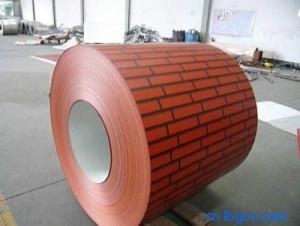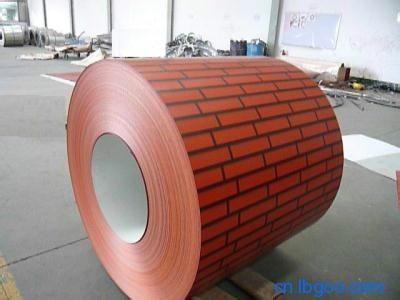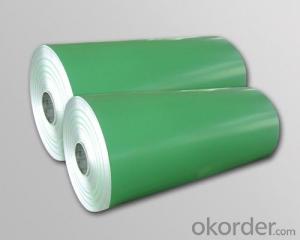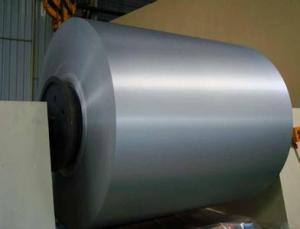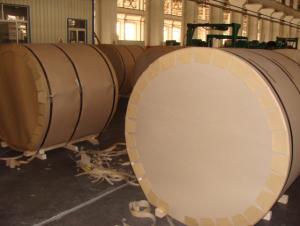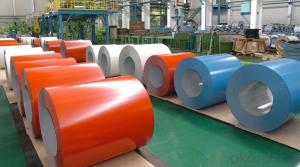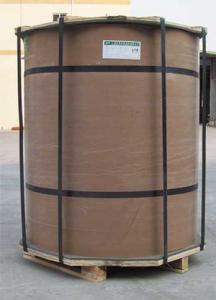Aluminum Coil Wholesale - New Coated Aluminium Coil AA8XXX
- Loading Port:
- China Main Port
- Payment Terms:
- TT OR LC
- Min Order Qty:
- -
- Supply Capability:
- -
OKorder Service Pledge
OKorder Financial Service
You Might Also Like
Product Description:
1 Specifications of PE Coated Aluminum Coil/Sheet
Alloy | AA1050,AA1060, AA1070, AA1100, AA3003, AA3004, AA3005, AA3105, AA5005, AA5052, AA5754, AA5083, AA8011 |
Temper: | H12, H14, H16, H18, H22, H24, H26, H32,HO, F |
Thickness: | 0.10-4.0mm |
Width: | 10mm- 2000mm |
Coating | PE(Polyester) |
Painting Thickness | Standard 16-25 microns, max 40 microns |
Color | Acording to Ral colors or customer’s samples |
Standard: | GB/T17748-1999, ASTM, ISO, EU standard |
Special Specification is available on customer’s requirement | |
Paint Material:PPGI,BECKER, NIPPON.
PE(polyester) Coating
PVDF
2 Usage/Applications of PE Coated Aluminum Coil/Sheet
Our company's PE Coated Aluminum Coil/Sheet have been widely used in the fields of construction and decoration(garage doors, ceiling etc.), electronic appliances, lighting decoration, air-condition air pipe, sanwich panels and drainage, etc.
- Q: Cost of aluminium coil coating fluorocarbon paint?
- Metal aluminum coil fluorocarbon paint that you don't know, Party A has no life, specific indicators of fluorine content in the product price between 120-180 GB / kg (according to different prices in different colors, the price from low to high color from shallow to deep) per kilogram spraying 3-5 square meters (according to the construction process and the environment skilled workers, such as spraying area under the influence of objective factors) warranty period for more than 15 years, GB product prices between 80-150.
- Q: Are there any specific guidelines for the storage of aluminum coils?
- Aluminum coils have specific guidelines for storage, and here are some key considerations: 1. When storing aluminum coils, it is necessary to place them in a clean, dry, and well-ventilated area. The storage facility should be free from excessive humidity, direct sunlight, and temperature fluctuations. 2. To prevent damage, handle the coils with care. Appropriate lifting equipment should be used to lift them, avoiding any bending or deformation. 3. Proper support is crucial when stacking the coils to prevent distortion or collapse. It is recommended to stack the coils horizontally on a flat surface, preferably on pallets or racks. Sufficient space should be left between each coil to allow for ventilation. 4. Protect the coils from dust, dirt, and moisture. Cover them with suitable protective materials like plastic sheets or tarpaulins to prevent contamination or oxidation. 5. Labeling each coil with relevant information, such as the alloy type, size, and production date, is advisable. This helps with easy identification and efficient inventory management. Additionally, maintaining an organized storage system prevents damage and enables efficient retrieval. 6. Regular inspection and inventory checks are necessary to identify any signs of damage or deterioration. Rotate the coils to ensure proper usage and avoid prolonged storage that could affect quality. It is important to note that these guidelines may vary depending on the specific requirements of the manufacturer or supplier. Therefore, it is advisable to consult the manufacturer's recommendations or seek professional advice for the storage of aluminum coils.
- Q: This question asks for methods to preserve the lifespan of an aluminum coil.
- <p>To maintain an aluminum coil and ensure its longevity, follow these steps: Store the coil in a cool, dry place away from moisture and direct sunlight. Keep it clean by regularly removing dust and debris. Avoid scratching or denting the coil's surface. Handle the coil carefully to prevent damage. Use appropriate lubricants when necessary to reduce friction. Regularly inspect the coil for any signs of corrosion or wear and address these issues promptly. By following these practices, you can extend the life of your aluminum coil and maintain its quality.</p>
- Q: Can aluminum coils be used in power generation facilities?
- Yes, aluminum coils can be used in power generation facilities. Aluminum has excellent thermal conductivity, making it an efficient choice for heat transfer applications in power generation equipment such as heat exchangers and condensers. Additionally, aluminum's lightweight nature and corrosion resistance make it a viable option for various power generation processes, including wind turbines and hydroelectric power plants.
- Q: Can aluminum coils be used for electrical enclosures?
- Yes, aluminum coils can be used for electrical enclosures. Aluminum is a lightweight and durable material that provides excellent electrical conductivity and heat dissipation properties. It also has good corrosion resistance, which makes it suitable for various environmental conditions. Aluminum coils can be easily formed into different shapes and sizes, making them versatile for enclosure designs. Additionally, aluminum is a cost-effective option compared to other metals like stainless steel. However, it is important to ensure proper insulation and grounding when using aluminum coils for electrical enclosures to prevent any electrical hazards.
- Q: How are aluminum coils processed and shaped into different forms?
- Aluminum coils go through a series of processes to shape them into different forms. The first step is the uncoiling process, where the coil is unwound and straightened. This allows for easier handling and further processing. Next, the aluminum coil goes through a cleaning process to remove any dirt, grease, or other impurities that may be present on the surface. This is done to ensure that the final product has a clean and smooth finish. After cleaning, the coil is typically subjected to a series of heat treatments to improve its mechanical properties. This process, known as annealing, involves heating the coil to a specific temperature and then slowly cooling it down. Annealing helps to increase the aluminum's ductility, making it easier to shape and form. Once the coil is annealed, it can be processed into different forms using various techniques. One common method is called roll forming, where the coil is passed through a series of rollers that gradually bend and shape it into the desired form. Roll forming is often used to create sheets, strips, or tubes. Another popular shaping technique is called stamping, which involves using a die and press to cut or shape the aluminum coil into specific shapes. Stamping is commonly used to create intricate designs or components with precise dimensions. In addition to roll forming and stamping, other methods such as extrusion, bending, and welding can also be used to shape aluminum coils into different forms. These processes allow for the creation of a wide range of products, including automotive parts, household appliances, construction materials, and more. Overall, the processing and shaping of aluminum coils involve a combination of cleaning, heat treatment, and various forming techniques. These processes ensure that the aluminum is transformed into the desired form while maintaining its structural integrity and desired properties.
- Q: Can aluminum coils be used in the manufacturing of medical devices?
- The use of aluminum coils in the manufacturing of medical devices is possible. Aluminum is a versatile material that offers numerous advantages for medical device production. It possesses qualities such as being lightweight, corrosion-resistant, and possessing good thermal conductivity. These properties make aluminum coils suitable for a variety of medical applications, including medical imaging equipment, surgical instruments, and prosthetics. Medical imaging devices, like MRI and CT scanners, often utilize aluminum coils for transmitting and receiving electromagnetic signals. Aluminum's electrical conductivity allows for efficient signal transmission, improving the precision and quality of medical imaging. Furthermore, the lightweight nature of aluminum makes it easier to handle and maneuver during medical procedures. Surgical instruments also benefit from the use of aluminum coils in their manufacturing. These instruments require materials that are both sterilizable and durable, with high strength. Aluminum meets these criteria as it can be easily sterilized using various methods, such as steam, ethylene oxide, or gamma irradiation. Additionally, its durability ensures that the instruments can withstand repeated sterilization cycles without degradation, while its high strength guarantees they can endure the forces applied during surgical procedures. Moreover, aluminum can be employed in the production of prosthetics, specifically artificial limbs. The lightweight nature of aluminum makes it an excellent choice for creating prosthetic devices that are comfortable for patients to wear and move around with. Additionally, its corrosion-resistant properties make it suitable for long-term use, as it can endure exposure to body fluids and environmental factors. In conclusion, the use of aluminum coils in the manufacturing of medical devices is indeed possible. The lightweight, corrosion-resistant, and electrically conductive properties of aluminum make it a valuable material for medical applications, contributing to the development of advanced and reliable medical devices.
- Q: This question asks for a comparison of the costs involved in purchasing new aluminum coils versus recycling old ones.
- <p>The cost of buying new aluminum coil versus recycling old ones can vary significantly based on several factors including market prices, quality of the recycled material, and the cost of recycling processes. Generally, recycling aluminum is more cost-effective as it requires less energy and resources compared to producing new aluminum from raw materials. The cost of recycled aluminum can be as low as half of that for new aluminum. However, the exact cost will depend on current market conditions and the specific requirements of the aluminum coils in question. It's advisable to get quotes from suppliers and recycling companies to determine the most economical option for your specific needs.</p>
- Q: Can aluminum coils be used for solar panel applications?
- Yes, aluminum coils can be used for solar panel applications. They are often utilized as the base material for solar panels due to their lightweight, corrosion-resistant, and durable properties. Additionally, aluminum coils offer good thermal conductivity, enabling efficient heat dissipation in solar panels.
- Q: What are the different types of aluminum coils available in the market?
- There are several different types of aluminum coils available in the market, each with its own unique characteristics and applications. 1. Plain Aluminum Coils: These are basic aluminum coils that are typically used for general applications. They have a smooth surface and are often used in construction, automotive, and packaging industries. 2. Color Coated Aluminum Coils: These coils are coated with a layer of paint or other finishes to enhance their aesthetic appeal and provide additional protection against corrosion. They are commonly used in the manufacturing of building facades, signage, and decorative applications. 3. Embossed Aluminum Coils: These coils have a textured or patterned surface, which gives them a decorative and non-slip finish. They are often used in applications where aesthetics and functionality are important, such as flooring, staircases, and decorative panels. 4. Anodized Aluminum Coils: These coils undergo an anodizing process, where a protective oxide layer is formed on the surface of the aluminum. This enhances their corrosion resistance and makes them suitable for outdoor applications, such as architectural elements, electronic components, and aerospace industry. 5. Pre-painted Aluminum Coils: These coils come with a pre-applied paint coating, which eliminates the need for additional painting or finishing. They are commonly used in industries that require high-quality, durable, and color-consistent products, such as automotive, appliances, and electronics. 6. Heat Exchanger Aluminum Coils: These coils are specifically designed for heat transfer applications, such as air conditioning and refrigeration systems. They have a high thermal conductivity and are often made from alloy grades that offer excellent corrosion resistance in harsh environments. It is important to consider the specific requirements and intended use of the aluminum coil before making a purchase. This will help ensure that the appropriate type of coil is selected for the desired application, thereby optimizing performance and longevity.
Send your message to us
Aluminum Coil Wholesale - New Coated Aluminium Coil AA8XXX
- Loading Port:
- China Main Port
- Payment Terms:
- TT OR LC
- Min Order Qty:
- -
- Supply Capability:
- -
OKorder Service Pledge
OKorder Financial Service
Similar products
Hot products
Hot Searches
Related keywords
